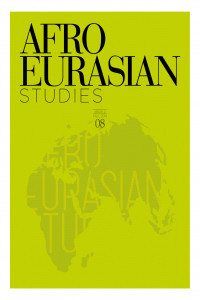Tanrı’nın Her Yerde Bulunması ve İlahi Cisimsizlik
İslam ve Hristiyan İlahiyat sahasında aşkın bir varlık olarak Tanrı’nın her yerde bulunmasının nasıl anlaşılması gerektiğine yönelik tartışmalar mevcuttur. Yaygın görüşe göre ilahi her yerde bulunma, Tanrı’nın dünyevi mahiyette bir bedene sahip olmaktan çok, O’nun bilgisi, gücü ve yaratmasıyla kısaca istidlali olarak her yerde bulunduğuna işaret eder. Yine ilahi cisimsizlik de O’nun diğer var olanlardan temel ontolojik farklılığına atfen anlaşılmalıdır. Bu çalışmada aynı zamanda bahse konu görüşler üzerinden Tanrı’yı cisimsel bir var oluştan tenzih eden aşkın mahiyeti ibadete layık olmak bakımından tutarlılığı ile bir arada değerlendirmeye tabi tutulmaktadır. Zira inanan için ibadete layık bir Tanrı’nın her yerde bulunması, O’nun yaratılmış maddi nesnelerdeki anlamıyla cisimsel olmamasını da gerektirir.
Anahtar Kelimeler:
Din Felsefesi, Tanrı’nın Sıfatları, Aşkınlık, Her Yerde Bulunma, Cisimsizlik.
Divine Omnipresence and Incorporeality of God
As a transcendent being, not all qualities of God are known, and the exact meanings of God's known qualities are still ambiguous for man. However, important evaluations are encountered in the field of Christian and Islamic Theology. According to the common view, the divine omnipresence indicates that God is everywhere with His knowledge, power and creation rather than having an earthly body. Therefore, He is immaterial, but His immaturity is a divine immaturity and continues to exist all over the universe in a way that we do not know its nature with our worldly experiences. On the other hand, there were also those who argued that it is possible to be found everywhere with an entity whose nature we do not know. In this study, at the same time, the transcendent nature, which makes God beyond a corporeal existence, is evaluated together with its consistency in terms of being worthy of worship.
___
- Akkaya, Veysel. 2015. “Muhyiddin İbnü’l-Arabî’de Arş Tasavvuru ve İstivâ Meselesi”. The Journal of Academic Social Science Studies 33:379-92.
- Aktürk, Eyüp. 2016. “Tanrı-Mekân İlişkisi: Her Yerde Bulunma ve Aşkınlık Sorunu”. Şarkiyat İlmi Araştırmalar Dergisi 8(2):942-61.
- Aquinas, Thomas. 1945. "Summa Theologica”. Basic Writings of Saint Thomas Aquinas. ed. A. Pegis. New York: Random House.
- Aquinas, Thomas. 1975. Summa Contra Gentiles. Notre Dame: University of Notre Dame Press.
- Augustine, Aurelius. 1953. “Letter 137 (to Volusian) and Letter 187 (to Dardanus). ‘On the Presence of God’” ed. I. Ç. W. Parsons. Saint Augustine Letters Vols. III.
- Fârâbi, Ebû Nasr Muhammed. 2017. "Uyûnü’l Mesâil”. İslam Filozoflarından Felsefe Metinleri. ed. M. Kaya. İstanbul: Klasik Yayınları.
- Gasser, Georg. 2019. “God’s Omnipresence in the World: On Possible Meanings of ‘En’ in Panentheism”. International Journal for Philosophy of Religion / 85:43-62.
- Goris, Harm. 2009. “Divine Omnipresence in Thomas Aquinas”. Ss. 37-58 içinde Divine Transcendence and Immanence in the Work of Thomas Aquinas. Leuven: Peeters.
- Hartshorne, Charles. 1941. Man’s Vision of God and the Logic of Theism. New York: Harper & Brothers.
- Hudson, Hud. 2009. "Omnipresence”. The Oxford Handbook of Philosophical Theology. ed. T. P. Flint ve M. C. Rea. Oxford: Oxford University Press.
- İbnü’l-Arabî, Muhyiddin. 2006. Fütûhât-ı Mekkiyye. çev. Ekrem Demirli. İstanbul: Litera Yayıncılık.
- Inman, Ross D. 2017. “Omnipresence and the Location of the Immaterial”. Oxford Studies in Philosophy of Religion / 8:168-206.
- Jantzen, Grace M. 1978. “On Worshipping an Embodied God”. Canadian Journal of Philosophy 8(3):511-19.
- Jantzen, Grace M. 1984. God’s World, God’s Body. Philadelphia: Westminster Press.
- Kar, Sait. 2014. “Bütün Dinler Aynı Hakikate Mi Götürür? Tanrı Anlayışları Bağlamında Bir Değerlendirme”. Atatürk Üniversitesi İlahiyat Fakültesi Dergisi/41”. 419-36.
- Kasar, Veysel. 1997. “Kur’an’da Müteşabihat’tan İstivâ Kavramı”. Harran Üniversitesi İlahiyat Fakültesi (i/3):201-27.
- More, Henry. 1995. Manual of Metaphysics. Hildesheim: Georg Olms.
- Newton, Isac. 1934. Mathematical Principles of Natural Philosophy. University of California Press.
- Opeloye, Muibi O. 2003. “Tanrı’nın Birliği ve Üçlü-Birlik; Kitâb-ı Mukaddes ve Kur’ân-ı Kerîm’deki Görüşlerin Analitik Bir Değerlendirmesi”. çev. Alparslan Yalduz. Uludağ Üniversitesi İlahiyat Fakültesi Dergisi 12(2):473-85.
- Paulsen, David. 1989. “Must God Be Incorporeal?” Faith and Philosophy 6(1):76-87.
- Stroumsa, Gedaliahu. 1983. “The Incorporeality of God, Context and Implications of Origen’s Position”. Religion / 13:345-58.
- Swinburne, Richard. 1977. The Coherence of Theism. Oxford: Oxford University Press.
- Taliaferro, Charles. 1994. Consciousness and the Mind of God. Cambridge: Cambridge University Press.
- Taliaferro, Charles. 2010. "Incorporeality”. A Companion to the Philosophy of Religion. ed. C. Taliaferro, P. Draper, ve P. L. Quinn. Oxford: Blackwell Publishers.
- Wainwright, William J. 1987. "God’s Body”. The Concept of God. ed. T. Morris. New York: Oxford University Press.
- Wainwright, William J. 2010. “Omnipotence, Omniscience and Omnipresence”. Ss. 46-65 içinde The Cambridge Companion to Christian Philosophical Theology, ed. C. Taliaferro ve C. V. Meister. Cambridge: Cambridge University Press.
- Webb, Mark Owen. 2010. "Perfect Being Theology”. A Companion to the Philosophy of Religion. ed. C. Taliaferro, P. Draper, ve P. L. Quinn. Oxford: Blackwell Publishers.
- Wierenga, Edward. 2005. “Omnipresence”. Stanford Encyclopedia of Philosophy.
- Wierenga, Edward. 2010. "Omnipresence”. A Companion to the Philosophy of Religion. ed. C. Taliaferro, P. Draper, ve P. L. Quinn. Oxford: Blackwell Publishers.
- Wolfson, Harry A. 1965. “Maimonides on the Unity and Incorporeality of God”. The Jewish Quarterly Review 56(2):112-36.
- Yavuz, Yusuf Şevki. 2001. "İstivâ”. Türkiye Diyanet Vakfı İslam Ansiklopedisi. İstanbul: TDV Yayınları.
- Zawadi, Bassam. 2019. “Does Divine Omnipresence Conflict with Divine Incorporeality”. Academia.edu. 15.09.2019, https://www.academia.edu /3716971/Does_Divine_Omnipresence_Conflict_with_Divine_Incorporeality.
- ISSN: 2147-110X
- Yayın Aralığı: Yıllık
- Başlangıç: 2012
- Yayıncı: Musiad (Independent Industrialists and Businessmen's Association)
Sayıdaki Diğer Makaleler
Ahmet Yesevi ve Küresel Hikmet
